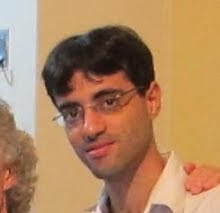| Conversation Galante by T. S. Eliot |
| I OBSERVE: “Our sentimental friend the moon! |
| Or possibly (fantastic, I confess) |
| It may be Prester John’s balloon |
| Or an old battered lantern hung aloft |
| To light poor travellers to their distress.” |
| She then: “How you digress!” |
| And I then: “Someone frames upon the keys |
| That exquisite nocturne, with which we explain |
| The night and moonshine; music which we seize |
| To body forth our own vacuity.” |
| She then: “Does this refer to me?” |
| “Oh no, it is I who am inane.” |
| “You, madam, are the eternal humorist, |
| The eternal enemy of the absolute, |
| Giving our vagrant moods the slightest twist! |
| With your air indifferent and imperious |
| At a stroke our mad poetics to confute—” |
| And—“Are we then so serious?” |
The poet pictures a man who talks about moon, stars, those useless things which have nonetheless poetical appealings.
But the lady with whom he talks discredits his poetical images and divagations.
In the second stanza, he is already upset with her and drop a hint saying there is music which exists to fill "our own vacuity". She feigns attention to the hint, then he gets more and more impatience until in the third stanza he explicitly says she trivializes all, "You, madam, are the eternal humorist,/ The eternal enemy of the absolute," but she minimizes the talking: "Are we then so serious?"
But the lady with whom he talks discredits his poetical images and divagations.
In the second stanza, he is already upset with her and drop a hint saying there is music which exists to fill "our own vacuity". She feigns attention to the hint, then he gets more and more impatience until in the third stanza he explicitly says she trivializes all, "You, madam, are the eternal humorist,/ The eternal enemy of the absolute," but she minimizes the talking: "Are we then so serious?"


Nenhum comentário:
Postar um comentário